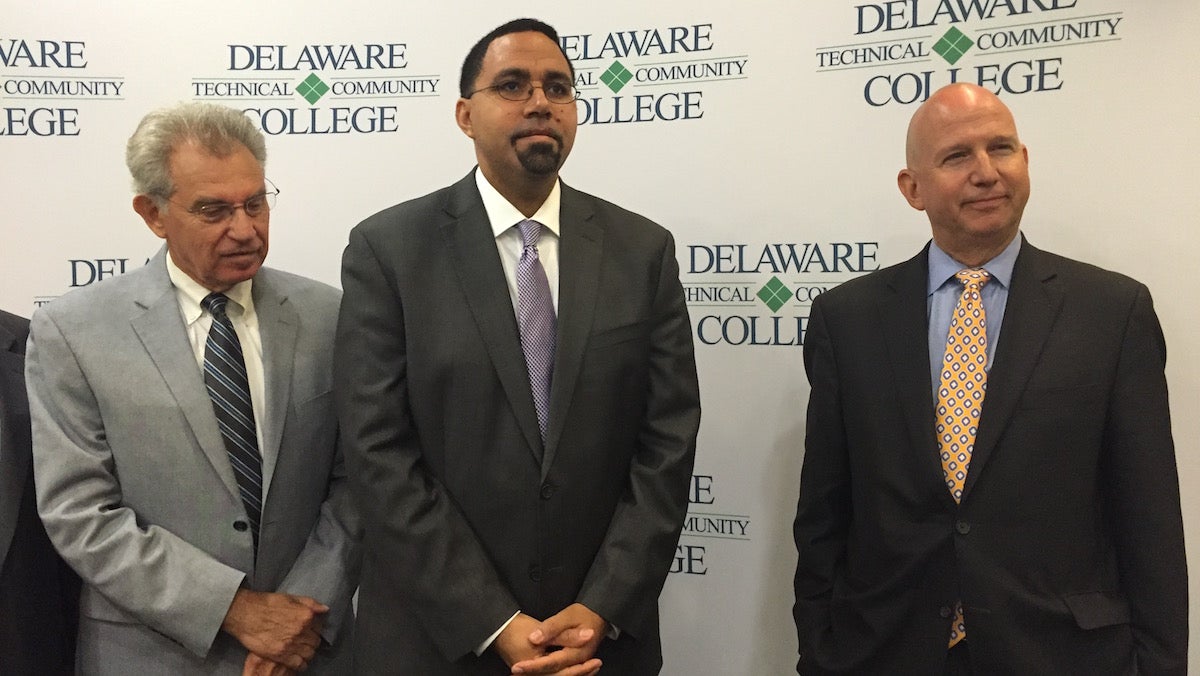Nation’s schools chief praises Delaware on early childhood education

(From left to right) Delaware Secretary of Education Steven Godowsky
U.S. Secretary of Education John King swung by Delaware Tuesday to praise the state’s progress on early childhood education and to keep the issue front and center as his boss, President Barack Obama, leaves office.
Delaware was among 20 states to receive federal money through the Obama Administration’s Race to the Top Early Learning Challenge, winning a $50 million grant in 2011. This week King singled out Delaware and Colorado for their successes since earning the grant money.
“This is a chance to highlight, celebrate, lift up your work as an example to the country,” King said at a roundtable discussion held at Delaware Technical and Community College’s Wilmington campus.
Pennsylvania, New Jersey, and Maryland also received about $50 million each through the Early Learning Challenge.
Delaware used its money to quadruple the number of early childhood centers participating in the state’s quality rating system and give nearly 20,000 health screenings to young children. Under Governor Jack Markell’s watch, the proportion of low-income children in high-quality early childhood center has climbed from five to 70 percent.
“Today there are more high-needs children in high-performing centers because of the work Delaware is doing,” said King.
King’s visit comes at a time of transition for both Delaware and the nation.
President Obama has pushed a $75 billion plan that would, in the administration’s terms, ensure universal access to quality pre-K for every low-income and moderate-income family. That proposal hasn’t budged in Congress, but the administration wants to keep early childhood education high on the national agenda as Obama leaves office.
“We want to make sure that we build on the national momentum around early learning and get to a place where we have universal access,” King said.
Markell faces a similar challenge in Delaware. Despite a bleak fiscal outlook, Markell convinced the General Assembly to increase the state’s early childhood allocation by about $9 million. That amount will largely cover funds lost through the expiration of federal money, according to Susan Perry-Manning, executive director of Delaware’s Office for Early Learning.
Of course there are no guarantees the next administration will continue to pick up the tab. To that end, Markell has remained an enthusiastic cheerleader for early childhood investment. On Tuesday he touted his administration’s accomplishments and reinforced the societal benefits of pre-K investment.
“There’s no doubt we will look back on the progress we’ve made in early childhood as one of the most important things that we’ve done,” he said.
Absent a change in the U.S. Congress, it’s likely politicians such as Markell will need local dollars to accelerate pre-K expansion. Take the case of Philadelphia, which recently approved a hotly debated soda and sweetened beverage tax in order to add 6,500 quality pre-K seats.
Mayor Jim Kenney sold the tax by highlighting what the new money would buy, focusing in particular on pre-K expansion. Opponents, however, said the tax would fall disproportionately on poor people and would be an unsustainable source of revenue as more folks stopped drinking soda or bought beverages outside the city.
Asked Tuesday whether he supported Philly’s tax, King demurred.
“Funding mechanisms are really a local decision,” he said. “Our vision is that we ought to be a partner to states and localities as they move toward universal access.”
WHYY is your source for fact-based, in-depth journalism and information. As a nonprofit organization, we rely on financial support from readers like you. Please give today.





